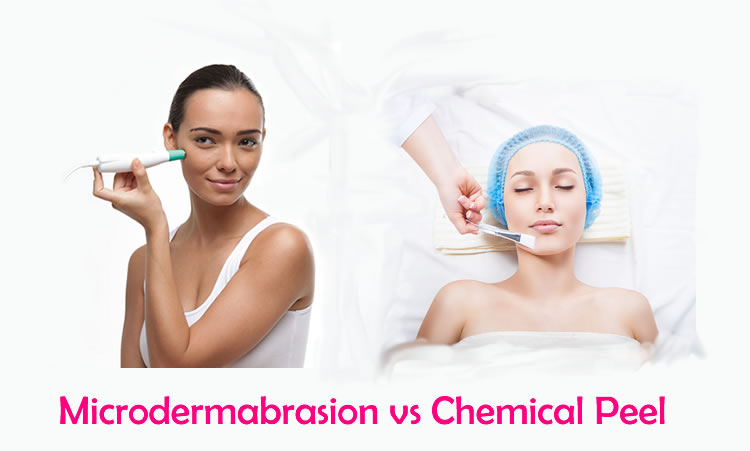If you’ve neglected your skin over the years and want to freshen its appearance, exfoliating treatments like chemical peel or microdermabrasion are a good place to start. They’ll help you to achieve the desired results without breaking the bank.
Microdermabrasion works well to eliminate superficial imperfections in your skin, such as wrinkles and fine lines. Chemical peels, on the other hand, deal with severe skin problems, such as scars and deep wrinkles. As the American Association of Dermatologists points out, microdermabrasion and chemical peels both treat uneven skin tone, age spots, and dull complexion.
A chemical peel or microdermabrasion procedure can give you the much-desired flawless skin, leaving your skin evenly toned and smoother than ever. They help to improve the appearance of your skin imperfections. That said, you should consider consulting your dermatologist before you initiate these procedures. It is also crucial to hire a qualified professional to perform such treatments.
Microdermabrasion vs. Chemical Peel: Which is Best for Your Skin?
Every type of skin must be routinely exfoliated. This helps the skin function properly and prevents dullness caused by the accumulation of dead cells. However, different exfoliation procedures will be more beneficial to certain types of skin more than others. For example, people with dry skin are likely to see better results from microdermabrasion than from the chemical peels treatments.
Microdermabrasion is a physical exfoliation procedure that is eliminates dead skin cells from your skin surface. A chemical peel makes use of chemicals to dissolve unwanted dead cells from your skin surface. It’s important to avoid using any exfoliants— like scrubs, enzymes, retinol or any other acids— 3-5 days before you perform the procedures. This will ensure that your skin is not too sensitive during the treatment. This article will provide information by comparing various aspects of microdermabrasion vs. chemical peel to help you make the best choice.

Distinct Differences Based on What Each Procedure Treats
Microdermabrasion focuses on improving the appearance of the surface layer of your skin, making it look more vibrant and youthful. However, it does not penetrate thick layers of skin; therefore, it does not improve the appearance of discolorations or wrinkles.
Chemical peels work on the skin imperfections and smooth out fine lines and wrinkles while reducing the occurrence of acne scars. A chemical peel can also help improve the appearance of discolored skin areas.
Which Procedure Delivers Immediate Results?
With microdermabrasion, it’s likely that you’ll see results almost immediately. However, optimal results will be realized once you have completed a series of recommended treatments. With chemical peels, the results will be achieved just after one peel. Dermatologists recommend that you carry out multiple treatments for best results.
How Long Do the Results of Each Procedure Last?
Microdermabrasion aims to give your skin a temporary youthful glow which fades away with time. However, a chemical peel will last longer than microdermabrasion. For instance, one chemical peel can last up to two months. If you get a series of chemical peels, then you will achieve long-lasting results.
Side Effects of Each Procedure
Microdermabrasion exhibits minor side effects such as redness, skin sensitivity, and bruising. Chemical peels also do not have significant side effects but a few patients complained of scarring, infection, and uneven skin tone.
Microdermabrasion vs. Chemical Peels: Which Procedure is More Affordable?
Generally, chemical peels are more expensive than the microdermabrasion procedures. You must buy chemicals for chemical peels, but microdermabrasion uses physical exfoliation techniques that are more affordable.
Microdermabrasion for Acne Scars: What to Expect?
Microdermabrasion is an affordable skin treatment that helps to reduce acne scars. It is a non-invasive and pain-free procedure that will help you achieve a youthful, glowing skin. Microdermabrasion is a resurfacing procedure that removes the outer layers of the skin.
Acne scars are marks leftover from previous breakouts. These scars become more pronounced with age as your skin starts losing more collagen every day. But microdermabrasion is a sure treatment for acne scars. Your dermatologist will use a small device to remove your epidermis. This procedure will reveal a toned, smooth skin that lies beneath your epidermis.

Microdermabrasion Pros and Cons:
Microdermabrasion has helped people to reduce acne scars, but there are some cons and pros of this treatment that you need to know. First, let’s focus on the advantages of using this type of skin treatment. Most microdermabrasion treatments don’t take long— a typical treatment is approximately 30 minutes.
The results are typically instantaneous and users can see dramatic results in case of mild scarring. Microdermabrasion can be done effectively in a dermatologist’s office or in a spa facility. It is more affordable than other, more invasive procedures that were previously used in acne scar treatment. Microdermabrasion is a pain-free procedure that will give you a glowing youthful skin.
However, there are some disadvantages related to this procedure. First, advanced age may affect its effectiveness. This is because production of collagen reduces with age, thus the pitted areas will not be filled. This procedure can cause redness of the skin, sensitivity, and bruising. These are some of the microdermabrasion pros and cons that you need to know before booking your acne scar treatment appointment.
Chemical Peel Before and After
A chemical peel is a procedure that will help you to maintain a smooth and healthy skin. It is effective for resolving common skin problems, such as fine lines, acne scars, and wrinkles. The good news is that chemical peels can be used virtually on all types of skin.
However, you need to prepare your skin before heading for a chemical peel treatment. For example, you can use a skin brightener to suppress production of melanin right after the peel treatment has been completed. This will make sure that dark spots are not formed after the procedure. After a chemical peel, you should avoid exposing your skin to direct sunlight as this damage your skin.


